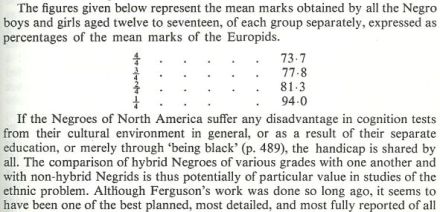In an earlier article, I have shown that the magnitude of sibling correlations among NLSY-ASVAB subtests correlates with the magnitude of g-loadings, but moderately with the magnitude of black-white IQ gaps in those subtests using Jensen’s method of correlated vectors, a possibly imperfect technique in some instances as explained in my previous article. In another post, it has been seen that US blacks having more (self-reported) white ancestry showed a higher IQ level, and that this effect is not mediated by skin color. Here, I will show that the magnitude of the score advantage for blacks with more white ancestry among subtests correlates with the above mentioned variables.
Month: April 2013
Number 4 in the social science’s top 10 list of “grand challenge questions that are both foundational and transformative” (Giles, 2010) is: “How do we reduce the ‘skill gap’ between black and white people in America?” Presumably, figuring out the cause of this psychometric intelligence differential would help when it comes to deciding how best to minimize it. If so, we can thank Meng Hu for his recent efforts focused on determining the cause. This includes his recent extensive exploration of differential regression.
Continue reading
Recently, the GSS released the survey results for the year 2012. And a skin color variable has been included. But rather than using the SDA program, available here, I used the GSS cumulative datafile 1972-2012 for SPSS, available here. This allows more complex analyses to be performed than what is possible with the SDA.
Continue reading
The IQ differences between blacks and whites lead to differences in sibling regression to the mean. The races regress to different means. Criticisms were made about the hereditarian interpretation of the differential sibling regressions. I will demonstrate that this phenomenon (1) is not a statistical artifact and (2) is consistent with the hereditarian interpretation of it.
(and Some Other Stuff)
I had noted previously that there is diminishing interest in classic HBD topics, such as race and IQ. And I pointed out elsewhere that virtually no one in the US with an IQ above the 85th percentile currently takes the hereditarian position on race and IQ seriously, at least as judged by the General Social Survey 2012 responses. So, perhaps, the views of HBD proponents are finally coming in line with those of the vast majority of the US population. Indeed, one of the leading minds in this field has recently stated:
Like many of us who are fascinated with human diversity, she has little or no interest in what are called race differences…. No one it seems cares much about that any longer. (Harpending, H. (April 14, 2013). West Hunter).
This increasing disinterest might explain why my colleague’s recent eloquent defense of general intelligence netted 53 comments while my post on my exhaustive analysis of color and IQ amongst siblings of different races, a topic hitherto never explored, netted precisely 0. There are other possible reasons for this, of course. Whatever the case, the nexus between race and IQ doesn’t seem to be as popular of a topic as it once was so it seems that I will do less unwell if I shift my focus elsewhere.
One race unrelated issue worth further exploring is that of Jews, meritocracy, and elite admissions. Continue reading
My defense of psychometric g has attracted more attention than I expected. It has been discussed on Metafilter, Noahpinion, Less Wrong, and iSteve, among other places. In this post, I will address some criticisms of my arguments and comment on a couple of issues I did not discuss earlier. Continue reading

The Dominican Republic shares the island of Hispaniola with Haiti, but has a much higher standard of living. Jared Diamond offered some characteristically plausible-sounding reasons for this disparity in his 2005 book Collapse, and these ideas received a fair bit of media coverage following the Haiti earthquake in 2010. While race and human capital both played a part in those explanations, Diamond did not mention intelligence differences (having already rejected this line of thinking as “loathsome” in Guns, Germs, and Steel (1997)). However, the theoretical relevance of this variable is obvious: intelligence and achievement tests are a more direct measure of individual human capital than input variables like education. Jones and Schneider (2006) found IQ to be “the most robust human capital measure” in an expansive dataset of international comparison measures—a better predictor of economic development than variables like educational spending and enrollment.
IQ and the Wealth of Nations (2002) did not include data for either Haiti or the Dominican Republic, but Lynn’s dataset has included one study for the Dominican Republic since the publication of IQ and Global Inequality (2006).
Here I scrutinize Lynn’s use of this reference and introduce a few more small studies. The data available for the Dominican Republic is quite meager. Continue reading
Some things never change
Nearly 100 years ago George Ferguson tested the racial genetic hypothesis of IQ differences and found the following remarkable results, as reported by Baker (1974):
Just a couple of days ago, the awesome Audacious Epigone pointed out that the GSS (2012) contains a color ratings scale. GSS (2012) gives us the following results:
As an online discussion about IQ or general intelligence grows longer, the probability of someone linking to statistician Cosma Shalizi’s essay g, a Statistical Myth approaches 1. Usually the link is accompanied by an assertion to the effect that Shalizi offers a definitive refutation of the concept of general mental ability, or psychometric g.
In this post, I will show that Shalizi’s case against g appears strong only because he misstates several key facts and because he omits all the best evidence that the other side has offered in support of g. His case hinges on three clearly erroneous arguments on which I will concentrate. Continue reading

